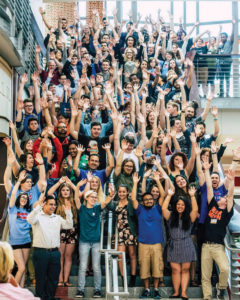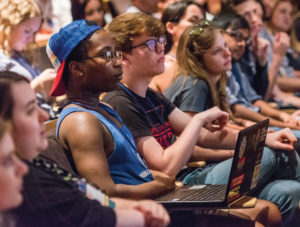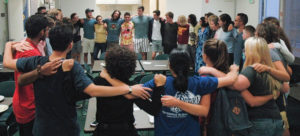Secular Students Are Leading the Way
 The 2018 Secular Student Alliance National Conference, held at Ohio State University, brought together secular student leaders from across the United States. Photo by Josiah Mannion.
The 2018 Secular Student Alliance National Conference, held at Ohio State University, brought together secular student leaders from across the United States. Photo by Josiah Mannion. IN MY CAPACITY as the national organizing manager for the Secular Student Alliance, I’ve had the opportunity to meet thousands of students across the country who eschew religious belief or a religious identity but who are seeking like minds and a sense of community.
I first met Sophia (a pseudonym used at her request) at “Sunday Dinner,” the bi-weekly meal that the Secular Student Fellowship (SSF) hosts at the University of Southern California during the academic year. SSF is the USC chapter of the Secular Student Alliance (SSA). They typically have a topic for table discussions and a homecooked vegan meal that is open to everyone. Toward the beginning of the semester the room reaches its capacity with as many as fifty students in attendance. After meeting her briefly at two or three dinners, I invited Sophia to get coffee with me so I could learn more about her story and see what made the Secular Student Fellowship a place she wanted to be.
I learned that Sophia was raised in the Northeast of the United States in a Catholic family. Though the family was religious and Sophia grew up going to church, they didn’t attend every week, and, like many American Catholics, they weren’t strictly observant of the church’s teachings. As a result Sophia never felt compelled to attend church as she grew up. When her personal choices conflicted with archaic church teaching, she felt no qualms about going her own way. When she got to USC, she was excited about the remarkable opportunities at her fingertips but struggled, as many do, to find her group and fit in. One day someone suggested she might like to attend one of the SSF meetings. What she found was a group of thoughtful, open-minded, generous students who were having the conversations that she most wanted to have. Sophia joined SSF not because she was especially frustrated with religion, but because she had found a group of people who cared about the things she cared about and who were engaged in exploring the values and the life choices they each wanted to make.
Noah is another student I’ve had the privilege of working with. He’s a junior at Jacksonville State University in Alabama and has been a leader in his SSA chapter for the past three years. Noah grew up in a Southern Baptist household not far from where he attends school. At some point during middle school, when a few of his friends started coming out as gay or lesbian, he wrestled with his church’s teaching that his friends were destined for eternal damnation. After a long struggle, he finally decided he could no longer be a Christian.
Noah has been instrumental in putting on an annual drag show to raise funds for The Magic City Acceptance Center in Birmingham. “There are few places in the US where it is harder to be a LGBTQ youth,” Noah told me recently. “Our club sees the need. We help and support queer students on campus and are listed by the university as an LGBTQ resource.” For this and other examples of courageous leadership, Noah was recently awarded the 2019 SSA Distinguished Leadership Award.
Secular students are as different from each other as you would expect of any subpopulation of students. Some are passionate firebrand atheists, others are curious agnostics, others are powerful activists, and still others are compassionate community builders. Most are some combination of these, and more. But regardless of the variety, one thing is clear: the number of high school and college-aged young people who do not adhere to any religion is growing quickly. According to a 2016 study by the DC-based Public Religion Research Institute, 39 percent of Americans aged eighteen to twenty-nine are “nones.”
According to a study by the DC-based Public Religion Research Institute, 39 percent of Americans aged eighteen to twenty-nine are “nones.”
There are many consequences of this broad social transformation. The emerging generation is much more likely to embrace people regardless of their race, gender, sexual orientation, or belief system. They are more likely to rely on scientific evidence in understanding the world and crafting solutions to our biggest problems, such as the climate crisis and global health. But it also means that there is an emerging gap in the American social fabric.
Independent of whether religions are right or wrong about their metaphysical claims or whether they have been a net negative or positive influence on the world, the fact is that people have historically turned to their religions for value formation and social cohesion. Religions have provided a valuable social space outside of the ordinary spaces in which modern folks live their lives: home and work. Religious spaces are not about making a living or fostering intimate relationships, per se. At their best they’re about answering the question, what kind of human being ought I be? The fact that religions, especially in their most conservative or fundamental forms, can be quite wrong in their teaching about how to be good doesn’t change the fact that one of the primary purposes of religion is to shape people’s values and then invite them to live out those values.
As people depart from religious institutions in record numbers we are entering unknown territory. Perhaps young adults don’t need community to help them shape and live out their values. I frequently hear from individuals in the broader secular community that they don’t need to meet with other nonbelievers and share life together. Perhaps some have negative associations with the religious practices of their past, while others might be repelled by the social environments that are currently available, many of which favor extroverts. Maybe students will be just fine on their own. On the other hand, there is an unprecedented mental health crisis unfolding on college and university campuses across the country. A survey taken last fall by the American College Health Association (ACHA) revealed that nearly two-thirds of students have felt “overwhelming anxiety” in the past twelve months and 40 percent have felt “too depressed to function.” Sixty-three percent say they’ve “felt very lonely.”
In a recent Los Angeles Times op-ed, USC Dean of Religious and Spiritual Life Varun Soni wrote,
over the last several years, these conversations have taken a devastating turn. Whereas students used to ask, “How should I live?” they are now more likely to ask, “Why should I live?” Where they used to talk about hope and meaning, now they grapple with hopelessness and meaninglessness. Every year, it seems, I encounter more stress, anxiety, and depression, and more students in crisis on campus.
I volunteer as humanist chaplain at USC and work with Dr. Soni on a regular basis in the context he describes. Students like Sophia and Noah are the norm. They’re looking for their people—those who are having the sorts of conversations they want to have about meaning and values and who are doing the sorts of things they feel moved to do, such as fighting for the human rights of all people, including atheists.

Image: Josiah Mannion
At the Secular Student Alliance we understand ourselves as a resource and support for the passion and creativity of secular students. Each of our more than 300 chapters on campuses in nearly all fifty states, including Washington, DC, and Puerto Rico, is unique and reflects the goals and aspirations of the students who lead it. Some are struggling against Christian hegemony and outright discrimination on their campus, others are on campuses presumed to be secular but where no explicit support structure exists for non-religious students. Some chapters focus on science literacy; others emphasize interreligious understanding and cooperation. But all of them are building communities where their fellow students feel like they can belong and connect.
The Secular Student Alliance was founded in 2000 by alumni from Ohio State University. In response to their work on the OSU campus, students from other parts of the country indicated that they wanted to start secular clubs on their respective campuses. Now in its twentieth year, SSA has steadily grown to be the largest organization in the United States devoted to serving non-religious students.
Last year when we surveyed our student members and alumni, they told us definitively that safe, supportive community is the number-one thing they value in their SSA chapter. Two thirds of respondents said that “community, friends, and sense of belonging” was the most meaningful part of being a member of an SSA chapter. To support this need, the theme of the 2019 SSA conference (held in Los Angeles, California, in July) was “Better Together,” where we shared the science and practice of creating communities that provide exactly the kind of support students are longing for.
When it comes to activism, students are once again clear about their priorities: they want to fight to support and enhance the wall of separation between religion and government in the United States. As a result, SSA is supporting our students this academic year with new tools to help them learn who their elected officials are, where those officials stand on key issues they care about, and how to directly express their views in a way that makes a difference. With the next major national election just around the corner, the Secular Student Alliance is partnering with other national secular organizations to do voter registration drives, candidate forums, educational programs on a variety of issues, and voter mobilization. College students are first-time voters and their values can make an enormous impact on our future as a country.

Image: USC Photo/Joanna Clay
Students also face pushback to their work from school administration and their own family members. One student at a community college in rural Illinois was initially told that her plans would likely meet resistance and that she might want to consider starting a different kind of club. She persisted, and today she’s not only the president of the SSA chapter but has also been elected to student government. High school administrators are usually the most wary about a secular club being started on their campus. For two years we’ve been wrestling with a high school in New Jersey that continues to tell the student leader that there is a moratorium on new clubs. Meanwhile a new video production club was started. We reached out to the Freedom From Religion Foundation, and they sent a letter to the superintendent of schools. So far the student has not received a response.
Many SSA students are not out about their nonbelief to their parents and do their activism in secret. Students’ personal struggle is often a greater challenge than any resistance they meet on campus, but the bonds they form with fellow students help give them a sense of hope and strength to help shape a different reality for themselves and others.
We also help students do fun things that build community while educating and giving back. This year we held our first-ever Secular Spring Break in partnership with Foundation Beyond Belief (FBB) and All Hands and Hearts. Eight students accompanied SSA Executive Director Kevin Bolling and FBB Program Director Wendy Weber to Puerto Rico to assist with rebuilding homes still damaged two years after Hurricane Maria. “The entire secular community would have been proud to see the impact our students were making in Puerto Rico and honored to have them as representatives of the secular movement,” Bolling said. “It was a pleasure to work alongside them in Puerto Rico and every day as they put their values into practice.”
When we surveyed our student members and alumni, they told us definitively that safe, supportive community is the number-one thing they value in their SSA chapter.
This semester students will have the opportunity to screen the documentary film Hail Satan? on their campus. Released in April, the film is a sometimes funny, sometimes sobering look at the history and current work of the Satanic Temple. The subject matter is provocative and can help students, faculty, and staff think in fresh ways about religious freedom.
Christian denominations and parachurch organizations are pouring millions of dollars into keeping young adults in their particular faith through their college years when they are most vulnerable to the influence of history, philosophy, anthropology, sociology, psychology, physics, chemistry, and all the rest. These academic disciplines cast doubt upon the religious narratives that students have been raised with. Religious leaders know that in order for students to survive higher education with their faith intact, they will need to invest in keeping them on the so-called straight and narrow. Absent support from the secular humanist community, those students might miss the opportunity to learn more deeply and feel safe in broadening their horizons. This is why we, with generous support from thousands of individuals, invest in the next generation of secular leaders.
Malcolm X was right when he said, “Education is the passport to the future, for tomorrow belongs to those who prepare for it today.” Secular students are doing exactly that. The education they are receiving now, both from their academic work and their secular activism, is preparing them to lead the way to our secular future.
